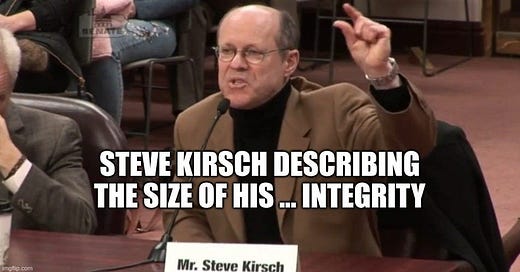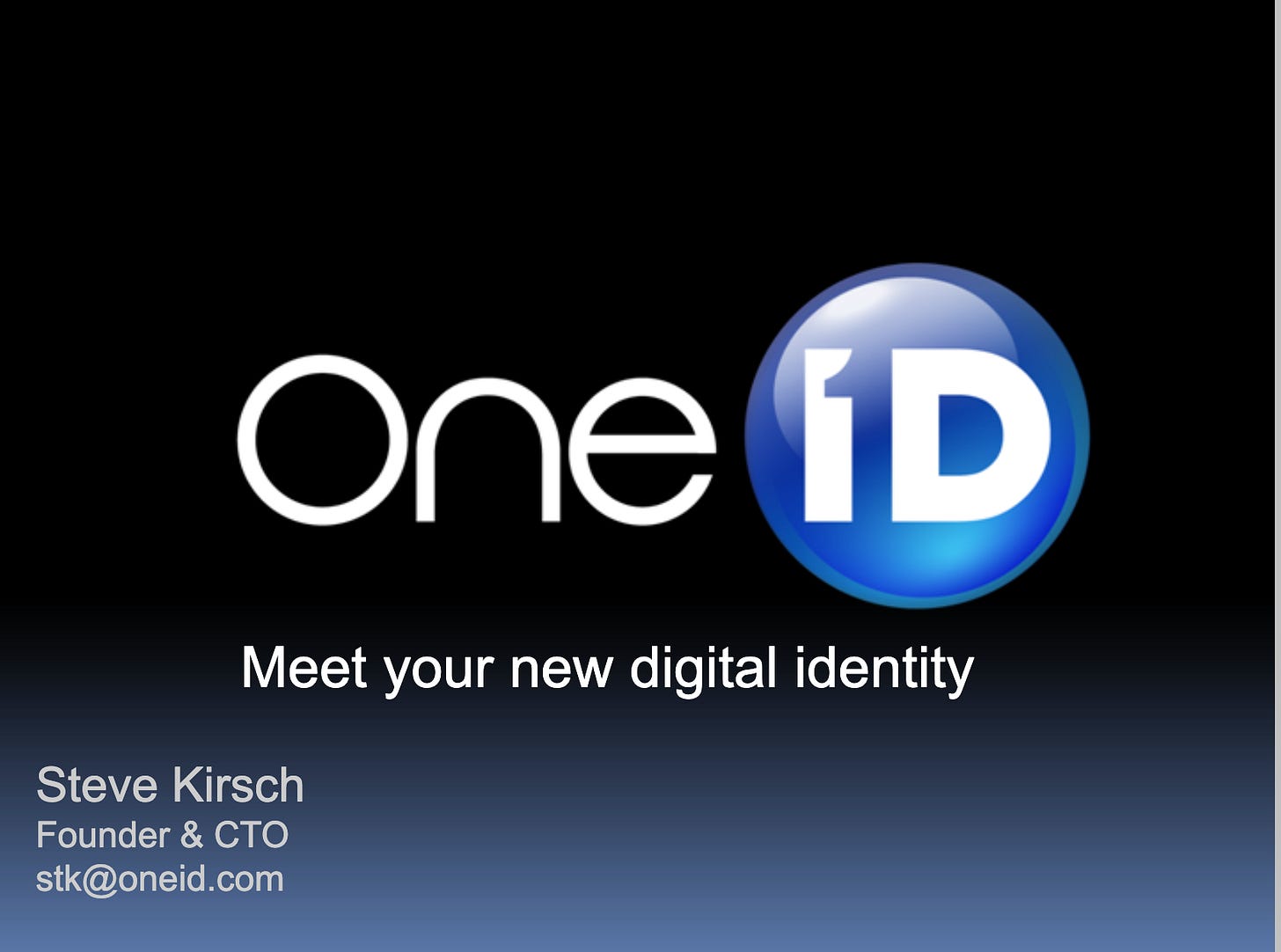Steve Kirsch: the King of Digital ID, CBDC, Digital Money = Digital Slavery
Kirsch - the Lifelong Progressive Pretending to be Conservative, bringing us digital slavery
Above meme STOLEN from
Meet the king of Digital ID, CBDC, and dark money (hiding donation info to his nonprofits, same as Robert F. Kennedy, Jr.). I was asked to provide the receipts confirming that Kirsch was involved with the creation of a digital ID company and involved in CBDCs- he absolutely was. It’s hard for some Kirsch fans to accept that Kirsch is fooling Conservatives and Independents into trusting him while he ropes them into digital slavery (
is doing the SAME DAMN THING).Why the focus on Conservatives and Independents? That’s a topic for another day. But I blame Steve Bannon for Kirsch’s success in fooling these folks. I’ve been watching it happen for the past few years.
He’s hijacked a mostly Conservative Medical/Freedom Movement, fooled Conservatives and Independents into trusting him. How much has he paid Steve Bannon and Conservative, Inc. in order to have access to their audience? Steve Bannon, disappointingly, has been the useful idiot of Kirsch & Malone.
Back to the Digital ID issue:
Why did Steve Kirsch start OneID?
ABSTRACT: My wife is always telling me how she hates usernames and password. I concur. I have over 400 usernames and passwords. Usernames and passwords are horrible for users: hard to remember, hard to use, and insecure. I think I must spend at least 30 minutes a day on identity issues like these. The current identity solutions aren't good for service providers either: risk of mass breach, support costs, loss of traffic from users who can't get past the login screen, and loss of sales due to friction from cart abandonment and/or forgotten passwords.
That's why I created OneID: to provide a better alternative to today's antiquated identity paradigms. OneID is identity re-invented; the future of identity. It is the world's first trustable third-party Identity as a Service (IaaS). A brand-new identity architecture that is easy to use, private, and secure. A single user-centric permanent identity that you manage, it works for consumer and enterprise applications, on-line, in-person, and over-the-phone, it's always in your control, on your devices, and it is way better than anything else on the market today. You can get one in 15 seconds. It doesn't even require a download.
Vinod Khosla Bets Millions on One Digital Identity
10-12-2012
On October 5th, I interviewed Alex Doll, OneID's CEO and co-founder who was former Chief Operating Office of PGP. (OneID's founder is Steve Kirsch, who founded InfoSeek.) Doll was an entrepreneur in residence with Khosla after PGP.
Kirsch approached the venture firm seeking funding for his idea in December 2011. Doll worked with Kirsch on the series A round and then joined as CEO in April 2012.
OneID is working on what is known in Silicon Valley as a big "customer pain point." MasterCard(MC) research found earlier this year that consumers named entering payment information as the biggest pain point when making online purchases, second only to worries that something they bought online won’t fit them.
58% told MasterCard that they wanted all their information in a single safe, secure place that could be "authenticated instantly and automatically through their device – laptop, tablet or smartphone – without having to register or log in, and then get essentially get one-click purchasing ease."
That, according to Doll, is what OneID is doing. And the company has 20 people and $7 million raised in April 2012 to do that. According to Doll, OneID's technology looks to the consumer like a single button on a web browser or handheld device that gives an e-commerce service provider the information they need to complete a purchase on behalf of a consumer.
To authenticate that digital identification, OneID runs a "triangle in the background," according to Doll. The three vertexes of that triangle include "cryptosecrets on the browser, the mobile device, and OneID's cloud." If all of them agree, then OneID authorizes the transaction.
What would happen if you happened to leave your iPhone in a cab and a less than ethical person decided to buy up a storm by pushing that digital identification button? Doll offered two suggestions. First, you could go to any Web browser and turn off the digital id; second, if you don't realize your iPhone is lost until an hour after the fact, the amount that can be purchased through OneID is limited by default to $100 (and consumers can control that limit).
OneID is partnering with e-commerce platforms like Acadaca, MarketLive and Magento. Magneto's platform, for example, is used by125,000 merchants -- letting them control key service elements including, "the user experience, catalog, content and functionality of their online store."
Doll believes that if such platforms are comfortable with the security and efficiency benefits of its technology, then it will be easier for OneID to gain market share.
In an October 12 interview with Acadaca's Frank Weil, I learned that this leading fashion e-commerce platform company is almost done with trials it conducted with one of its clients. Weil found that OneID is making it easier for consumers to make purchases online and it has integrated well with Acadaca's technology.
Weil was eager to try OneID because he thought it would make life better for Acadaca's e-commerce clients and consumers. Thanks to the successful trial, he is ready to "push OneID live in two weeks." Weil has not discussed how it would pay for OneID.
However, Doll has in mind a so-called freemium business model. In that, OneID will make available a basic version of its software at no charge and then set a price for a more fully-featured version in the future.
On October 8th I interviewed John Heiliger of North Bridge -- a Series A investor in OneID -- who told me that he likes to invest in people he likes who are trying to solve customer pain in big markets. Heiliger, who used to run Facebook (FB)'s infrastructure, joined North Bridge in April 2012.
He likes Kirsch and Doll and he knows that there are about 2.5 billion people with Internet access who have to deal with the problems of having multiple user names and passwords. Thanks to the growth of the mobile Internet, that number will grow.
And while Heiliger does not know exactly how OneID will generate revenues, he does think that as it gains acceptance among these platforms, they will see the benefits of using OneID and be willing to pay.
Specifically, Heiliger sees OneID offering three key benefits to e commerce service providers: reduction in "consumer online shopping cart abandonment, less friction, and better security." For example, with OneID, consumers will not need to type in all their address and credit card information every time they want to buy -- thus boosting the odds that they will complete their transactions.
Heiliger expects OneID to use the funds from the Series A investment to complete its trials with platforms and get consumers using the service. In this way, OneID should be able to figure out a business model and, Doll and Heiliger, expect the company to be ready to expand to the next level.
Time will tell whether they can take OneID beyond the experimental stage and turn it into a significant enterprise.
3-15-2024
OneID stands as the world's first truly all-in-one digital identity solution, offering a universal identity across 80+ blockchains. Unlike other domain name services, OneID offers a global digital identity solution with manifold applications and utilities that will expand exponentially in the future. The collaboration between OneID and Halo Wallet is set to usher in a new chapter of digital identity and asset management, intertwining the strengths of both platforms to provide a seamless, secure, and user-centric experience in the Web3 landscape. This integration represents a significant leap forward in the quest for a more accessible and unified digital ecosystem, empowering users to navigate the open economy with confidence and ease.
The collaboration allows Halo Wallet to use OneID services, giving users access to over 80 blockchains through ID Name. This means users no longer have to handle multiple chains and addresses, making asset management and transactions simpler. With OneID's digital identity solution, Halo Wallet users enjoy added convenience, enhancing their overall experience.
Digital ID, Web3, CBDCs, Blockchain, Crypto Bros - all roads lead back to Steve Kirsch.
“Hmm. Methinks he doesn’t like all of us mouthbreathers.
Or maybe not? Kirsch launched OneID as the future of identity to help us be free from all of those pesky passwords…so he says. If you have the attention span to read through his article, Kirsch alludes to the government approaching him about this idea. This is the same government that he is supposed to be at odds with over the COVID shots. Hmm.
More importantly, old Stevie boy was the CEO of M10 Networks, which develops CBDCs for banks—including the big boys!
Co-founder Kirsch stepped down from this fancy job of creating weaponized money to go along with digital identification right in time for his emergence as a COVID dissident internet celebrity. Ah-ha! He’s obfuscating what the shots are really about and what really causes disease. We are currently undergoing a plethora of paradigm shifts and Kirsch is one of the key propagandists for the financial transition.
That is his purpose.Following Steve Kirsch is a one-way ticket to digital enslavement.”
The "TransferX" project
I have a clever way to modernize the transfer of authentication, value, and information. It makes what we do today look like we are in the stone age.
2/25/2024
“It’s always bothered me that Canadian truckers had their bank accounts frozen by the Canadian government. That’s not right.
A week ago, an idea came to me that will enable us to create a parallel economy that is resistant to such abuse. And the beauty is that it makes the existing mechanisms for:
identify,
transfer of value and
transfer of information
obsolete. It’s a way better solution.”
Confirmation bias? Not really, Kirsch has a record of performance that others have highlighted and memorialized/archived. Kirsch deleted his early treatment website, same as Robert Malone has done with his website - deleting pages that are inconvenient now that they’re pandering to Conservatives and Independents, as if we don’t know their history.
To be continued….













Thank you La Gata for doing the thorough look and expose of Kirsch’s intentions. This confirms our early perceptions and concerns. We documented here.
https://gingerbreggin.substack.com/p/robert-kennedy-steve-kirsch-and-robert
I should patent my instincts and sell 'em.
Anyway--good work here, Vilma.